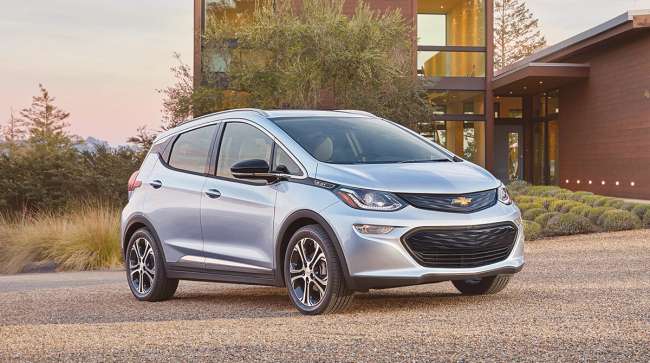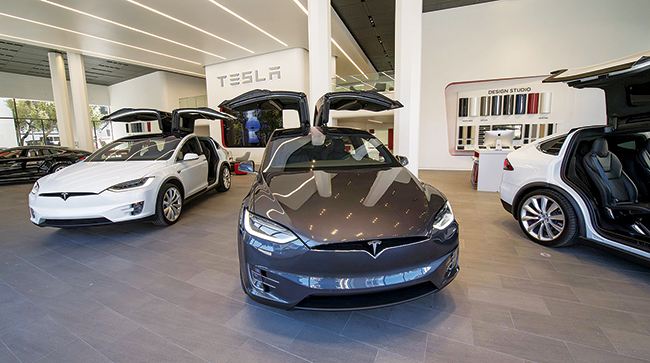Bloomberg News
GM, Tesla Head for New Year Without Electric Vehicle Tax Credits

[Stay on top of transportation news: Get TTNews in your inbox.]
General Motors Co. and Tesla are about to become the first automakers that will have to sell EVs without the benefit of a $7,500 federal tax credit.
Congress failed to include legislation in a spending bill that would have tripled the 200,000 cap on the number of EVs per manufacturer that qualify for tax credits. The legislation would have allowed GM, Tesla and any other automaker hitting that ceiling to offer a slightly lower tax credit of $7,000 for another 400,000 plug-in cars.
Now GM and Tesla, which pioneered the development of electric cars while other automakers sat on the sidelines, will enter 2020 at a disadvantage. Competitors such as Ford Motor Co., which has the battery-powered Mustang Mach-E SUV coming in late 2020, will effectively have a $7,500 discount over comparable GM and Tesla vehicles.
“Seventy-five-hundred bucks less than your competitors is a good thing,” said Brett Smith, director of propulsion technologies and energy infrastructure for the Center for Automotive Research. “It’s a little bit unfair in that both of these companies went out and really developed and pushed this technology, and now they are not going to have any federal discounts to offer.”
GM and Tesla might have to cut prices to make up the difference — but Tesla could be more insulated because of the high demand for its cars.
“For GM, I think it’s a bigger deal than it is for Tesla,” Smith said. “The Volt is a very nice electric car, but it’s not really an aspirational car. It can be cross-shopped a little bit more than Tesla vehicles.”
GM and Tesla both hit the lifetime ceiling of 200,000 electric vehicles per manufacturer that qualify for the tax break in 2018, triggering a phase-out process that saw the number of tax credits they could offer falling by half every six months until they hit zero on Jan. 1, 2020.
Tesla, GM and Nissan accounted for 62% of the 1.18 million electric vehicles that were on the road as of March, according to the Edison Electric Institute, which represents U.S. investor-owned electric companies. Carmakers sold 236,067 electric cars from January to September 2019, down from 361,307 in the same period of 2018, according to the Electric Drive Transportation Association, which lobbies for policies that promote electric-drive technologies.

Tesla's electric cars in a company showroom. (David Paul Morris/Bloomberg News)
Electric vehicles have been eligible for federal tax credits under a program that was first established by the George W. Bush administration. The program was later expanded by the Obama administration, raising the amount of the tax credit from $2,500 to $7,500 and instituting the current 200,000 EVs per manufacturer limit. The incentives were intended to encourage EV development by sweetening the deal on vehicles that are typically more expensive.
From 2010 through June 2019, GM sold 216,702 EVs; Tesla sold 436,548, according to EVAdoption.com, which tracks electric-car tax-credit use by manufacturer. Nissan is expected to become the next automaker to hit the cap in 2022 or 2023, according to the website.
U.S. Sen. Debbie Stabenow, D-Lansing, who introduced the bipartisan legislation that would have raised the ceiling on tax credits, blamed President Donald Trump for blocking the measure from being included in the government funding bill.

In Episode 23 of RoadSigns, we look ahead to trucking's future by looking back. Hear a snippet from host Seth Clevenger, above, and get the full program by going to RoadSigns.TTNews.com.
“President Trump promised to invest in Michigan workers, but just (last) week, we saw the opposite,” Stabenow said in a statement. “[He] blocked the next generation of vehicles and technology by saying no to the electric vehicle consumer tax credit. I want these clean energy jobs here in Michigan, not China.”
The White House did not respond to a request for comment. Trump has tried to kill the EV tax credit entirely in the past, and he has expressed skepticism about GM’s large bet on plug-in cars. He said eliminating the EV tax credit — long a popular target for conservative lawmakers — would save $2.5 billion over a decade.
“This is a missed opportunity to further advance electrification in the United States,” GM said in a statement. “The EV tax credit provides a proven pathway to establish the U.S. as a leader in electrification, helping make electric vehicles more accessible for all customers.”
Tesla did not respond to a request for comment. In its third-quarter filing with the Securities and Exchange Commission, the Silicon Valley automaker said it was likely the impending phase-outs caused some buyers to purchase a Tesla sooner than they otherwise might have.
“In the long run,” Tesla continued, “we do not expect a meaningful impact to our sales in the U.S., as we believe that each of our vehicle models offers a compelling proposition even without incentives.”
The EV tax credit has been a point of contention since its establishment 11 years ago. Conservatives have argued the federal government should not be propping up electric vehicles at a time when buyers have demonstrated a clear preference for gasoline-powered SUVs and pickups. They say the benefit goes primarily to wealthy buyers who can otherwise afford the higher sticker prices usually associated with battery-powered cars.
EV supporters say the tax credit has helped spur the market for plug-in vehicles. They argue that killing it would strip carmakers of a key incentive to convince drivers to cut dependence on gas pumps, and it would be harder for car manufacturers to hit government fuel-economy requirements.
“The electric vehicle tax credit has helped to put more than a million clean cars on the road, creating thousands of jobs along the way,” Sierra Club Legislative Director Melinda Pierce said.
“We must extend these investments for flourishing technologies like EVs to continue growing our economy and protecting the health of the planet.”
Want more news? Listen to today's daily briefing:
Distributed by Tribune Content Agency, LLC




